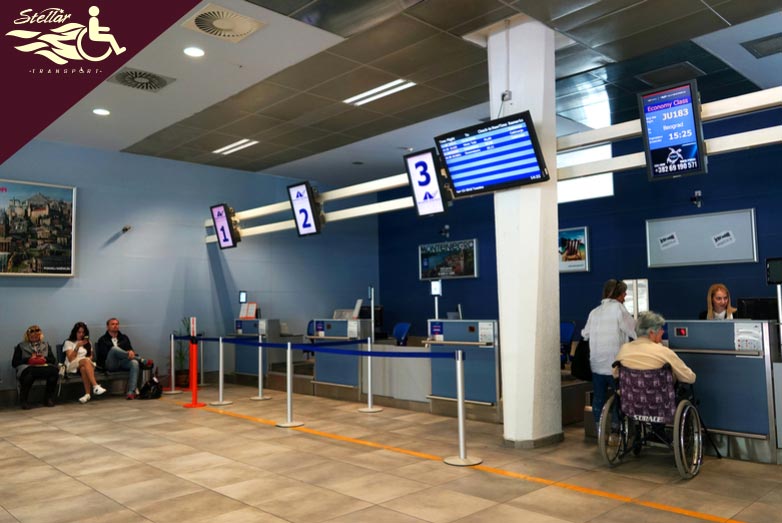Traveling with seniors doesn’t have to be stressful or dangerous, these simple precautions and useful tips can make traveling with seniors safer and more enjoyable. In fact, if you plan things out right, there are advantages to traveling as a senior.
For one, seniors qualify for more relaxed security restrictions. Simply visit the security desk when you arrive to receive expedited security checks and skip the long lines. Seniors can also request assistance from the moment they arrive at the airport until the moment they board their plane. You can call ahead to reserve assistance, or check in when you arrive.
TSA has made a few changes to their security policy so that it’s easier for seniors to travel. These changes include:
-People 75+ do not have to take off their shoes, sweaters, or jackets when going through security.
-Wheelchair patients receive special accommodations during the screening process.
-If you have a medical device, such as a pacemaker, you can request a pat-down at security instead of going through the scanner.
Here are 8 helpful safety tips to make traveling with seniors as easy as 1, 2, 3, takeoff!
#1. Talk to your loved ones’ doctor before you leave.
Prior to packing a bag or boarding the plane, check in with your loved ones’ doctor for a basic check up. This helps ensure seniors are healthy enough for travel. Plus, your doctor may have helpful tips for a safe trip. Let the doctor know about your travel plans so that they can recommend and administer proper vaccinations. This may include vaccines for typhoid, yellow fever, polio, or hepatitis.
#2. Call the Airport Ahead of Time to Reserve Wheelchair & Boarding Assistance
Don’t wait until you arrive at the airport to request a wheelchair and boarding assistance. There’s always a chance wheelchairs will be fully checked out, which can create a whirlwind of unnecessary stress and issues. By calling ahead you ensure a wheelchair is waiting and ready for your loved one the moment you arrive at the airport.
Even if a senior is mobile and does not usually require a wheelchair, it’s still helpful in an airport setting when you are trying to move quickly across long distances with heavy luggage. Standing in long lines or walking long distances can be hard on even the most mobile seniors. If a senior is traveling alone, airplane boarding assistance is incredibly beneficial, offering seniors peace of mind as well as hands-on help every step of the way.
#3. Pack Medications & Other Important Daily Needs In Your Carry On
The only thing you can expect on a commercial flight is the unexpected, and that includes the potential for lost luggage. Take medications and other daily necessities in a carry-on to prevent any serious medical issues.
Don’t forget additional medications to treat potential side effects of traveling, such as altitude sickness or traveler’s diarrhea. Pack enough medicine for the entire trip, plus a few extra days to accommodate potential travel delays.
#4. Wear Loose Clothing
Seniors should dress in loose and comfortable clothing for air travel. This helps promote better blood circulation during long periods of sitting. Sitting on an airplane for a long time can lead to blood clots, especially in seniors with poor blood flow. Your loved one may benefit from compression stockings that stimulate lower leg circulation. Avoid wearing tight socks or stockings; these do not work in the same manner.
#5. Move Around Frequently On the Plane
Muscles and joints don’t take well to long periods of sitting around, hence why it’s important to regularly get up and walk down the aisle. Simply wiggling your feet, legs, hands, and arms is helpful too. Experts recommend taking a walk down the aisle and/or taking a “wiggle break” once every 30 minutes when you’re awake on a plane.
#6. Stay Hydrated Before & During Travel
Airplanes can easily dehydrate passengers, and long periods of inactivity can make it easy to forget to drink water. Drink plenty of water before and during travel. Avoid caffeinated beverages and alcohol, as they further dehydrate the body. Seniors with diabetes are at an even greater risk of dehydration.
#7. Bring Gum For Takeoff
Chewing gum during takeoff helps reduce pressure in your ears and sinuses. If your loved one has sinus issues or a cold, they may need to take a decongestant before boarding a plane.
#8. Catch a Ride to the Airport With Stellar Transportation
Start your trip off right with the safest and most reliable non-emergency medical transportation in Melbourne, FL and beyond. We offer door-through-door service and treat every patient like a member of our family. Contact us today for a free quote!

